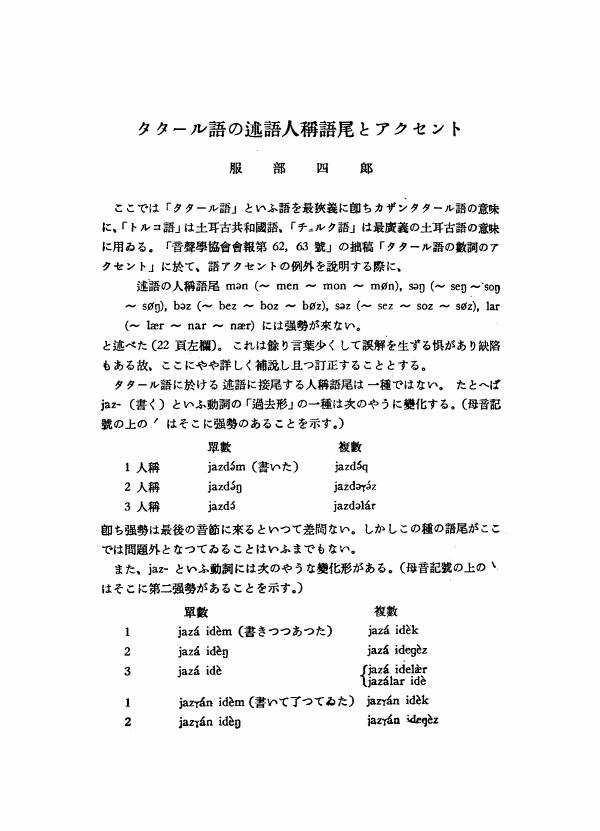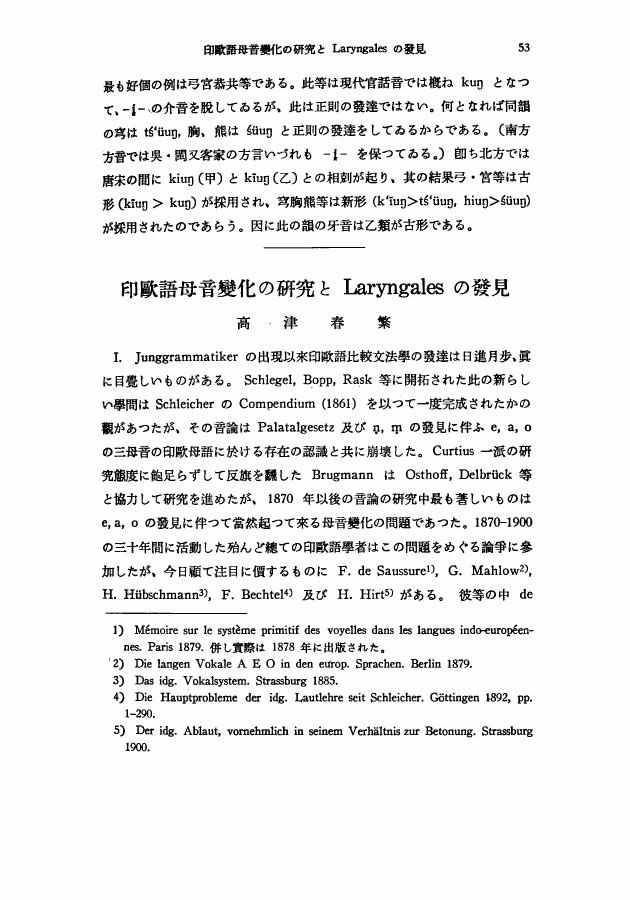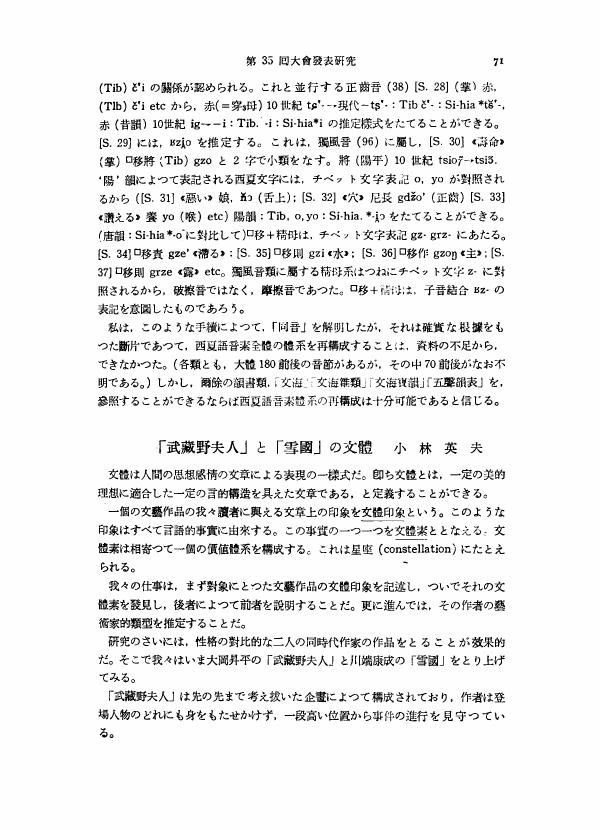2 0 0 0 OA 現代語の形容詞語幹型感動文の構造
- 著者
- 清水 泰行
- 出版者
- 日本言語学会
- 雑誌
- 言語研究 (ISSN:00243914)
- 巻号頁・発行日
- vol.148, pp.123-141, 2015 (Released:2016-05-17)
- 参考文献数
- 40
この論文は,「熱っ!」のように,形容詞語幹が声門閉鎖を伴って発話され,感動の意味が表現上実現する文(形容詞語幹型感動文と呼ぶ)を扱い,「感動の対象」を表す「主語」をとるかとらないかに着目して考察する。その結果として,形容詞語幹型感動文について,①即応性と対他性による分析から,構造上の「主語」をとらないと考えられること,②「これうまっ!」における「これ」のような形式は,話し手が聞き手に注意喚起を呼び掛けるための「感動の対象」の提示部であること,③形容詞語幹型感動文を構成する形容詞の性質の違い(属性形容詞か感情形容詞か)の観点から,属性形容詞によるものと感情形容詞によるものの二種に大別できること,④属性形容詞によるものも感情形容詞によるものも体言化形式を持ち,名詞句として感動の表出に用いられることで同じ感動文として機能すること,という四点を述べる*。
2 0 0 0 OA タタール語の述語人稱語尾とアクセント
- 著者
- 服部 四郎
- 出版者
- 日本言語学会
- 雑誌
- 言語研究 (ISSN:00243914)
- 巻号頁・発行日
- vol.1941, no.7-8, pp.68-82, 1941-04-30 (Released:2010-11-26)
- 参考文献数
- 5
- 著者
- 田中 聡子
- 出版者
- 日本言語学会
- 雑誌
- 言語研究 (ISSN:00243914)
- 巻号頁・発行日
- vol.1996, no.110, pp.120-142, 1996
This paper presents an analysis of the polysemic structure of the verb'mire (see)'. The word is used with various meanings. But all of its meanings, including those which seem to be arbitrarily extended, can be proved to be motivated and characterized by the nature of human cognition.Its meanings are not discrete but in their typical uses they are discernable by semantic features. The fundamental meaning (m.1) of 'mire'may be expressed in terms of the semantic features: <visual‹ <perception› . This assumption is supported by the fact that it is usually received in this meaning when it lacks the object word i.e. in the default case.The other meanings can be accounted for based on three principles of derivation which can be said to be psychologically valid: (1) incorporation of interpretive inferences into lexical meaning, (2) metaphor, and (3) metonymy.principle (1) ...... m.2: <visual‹ <perception› <judgement‹ ; m.3: <judgement› ; m.4: <visual‹ <perception› <judgement‹ <taking measures›principle (2) ...... m.5: <non-visual‹ <perception› <judgement‹principle (3) ...... m.6: varying from <experience of a state of affairs› to <occurrence of a state of affairsThe variations of m.6 reflect the degrees of "subjectification"(Langacker 1990: 316) of the viewer construed by the conceptualizer.
2 0 0 0 中期朝鮮語の漢字語アクセント体系
- 著者
- 伊藤 智ゆき
- 出版者
- 学術雑誌目次速報データベース由来
- 雑誌
- 言語研究 (ISSN:00243914)
- 巻号頁・発行日
- vol.116, pp.97-143, 1999
This paper aims to clarify the Sino-Korean accentuation in Middle Korean (MK)By "Sino-Korean", two different classes of material are understood. The first consists of the collections of Chinese characters glossed with Korean (in Hangul script), where the accent of each character is indicated by diacritical dots. The second consists of Chinese loanwords found in the texts in Korean (written entirely in Hangul), where the accent of such words is likewise indicated. The material of the first class is necessarily monosyllabic, while that of the second is often disyllabic. And these two classes show varying accentual notation even for the same character. In this paper the first class is called the SinoKorean Single Character, and the second the Sino-Korean Word.The Chinese characters belonging to the level tone in Ancient Chinese (AC) are marked as the low pitch in MK, and those belonging to the entering tone in AC are marked as the high pitch in MK. On the other hand, those belonging to the rising and departing tones in AC show a split in such a way that most of the characters belonging to the rising and departing tones in AC are marked as the rising pitch in MK (which I call the rising-departing A tone) and the rest of them as the high pitch (which I call the rising-departing B tone). The conditions which determine this split are so far unknown. This paper attempts to show these conditions.The Sino-Korean Word accentuation is the same as that of the Sino-Korean Single Character in the first syllable of a word, but differs in the second syllable in that the rising- departing A tone has the high pitch instead of the rising pitch. The Sino-Korean Words have various types of exceptions to this general tendency, while the Sino-Korean Single Characters are very regular and have few exceptions.In closing, two hypotheses are proposed: First, the Sino-Korean accentuation has the same origin as the Sino-Japanese (Kan-on) accentuation; Second, the regular correspondence between the accent of the Kyeongsang-Do dialect in Modern Korean on the one hand and the AC tones on the other suggest that MK and Modern Kyeongsang-Do dialect has the same origin as far as the Sino-Korean loanwords are concerned, namely they diverged after the Sino-Korean loanwords were introduced.
2 0 0 0 OA 印欧語母音愛化の研究とLaryngalesの發見
- 著者
- 高津 春繁
- 出版者
- 日本言語学会
- 雑誌
- 言語研究 (ISSN:00243914)
- 巻号頁・発行日
- vol.1939, no.3, pp.53-76, 1939-09-25 (Released:2010-11-26)
- 参考文献数
- 73
2 0 0 0 沖縄本島首里方言における複合語と連濁について
- 著者
- 宮良 信詳
- 出版者
- 学術雑誌目次速報データベース由来
- 雑誌
- 言語研究 (ISSN:00243914)
- 巻号頁・発行日
- vol.110, pp.79-119, 1996
In this paper, a set of three extremely simple wordformation rules, dealing with compounding, prefixation, and suffixation, are proposed and related to Rendaku(R)-voicing in the Shuri dialect, which has been used as the Standard Ryukyuan dialect since the prosperous age of the Ryukyuan Dynasty.It is argued that structures derived by these wordformation rules are effective not only in the account of ambiguous interpretations of some morphologically complex words, but also in the specification of a structural constraint on R-voicing in the case of complex words in the Shuri dialect.In the present analysis, R-voicing is directly applied to word structures derived by the proposed rules:they replace the Right Branch Condition'proposed by Otsu(1980)on R-voicing in Standard Japanese, or the cyclic rule-application of R-voicing presented in Ito&Mester(1986).The proposed analysis renders unnecessary the specification of boundary symbols in the phonological representation.
2 0 0 0 OA 標準語形普及の3段階
- 著者
- 井上 史雄
- 出版者
- 日本言語学会
- 雑誌
- 言語研究 (ISSN:00243914)
- 巻号頁・発行日
- vol.2004, no.126, pp.39-68, 2004-12-25 (Released:2007-10-23)
- 参考文献数
- 26
In this paper a new technique for representing dialectal differences will be introduced. Two techniques of simplification are applied to represent geographical distribution patterns of standard Japanese. The first one is a representation of two-dimensional geographical distribution patterns by one dimension. The second one is plotting the geographical locations making use of railway distances from cultural centers. By simplifying the two-dimensional geographical distribution into one by railway distance, another dimension can show the average percentage of usage of standard Japanese forms for each prefecture. In order to see the patterns of distribution of the Japanese standard forms, “Kasai data”, or numerical data of the “Linguistic Atlas of Japan”, was utilized.By comparing railway distances from Tokyo and from Kyoto in the form of scattergrams, the degree of linguistic influence of each of the capitals of Japan was analyzed. The overall pattern showed that railway distances surely correspond to standardization of dialects. The standardization of language in Japan proceeded in two historical stages. The first stage was standardization from Kyoto. The second stage appeared later from Tokyo. These two stages were-ascertained by classifying 82 words into 4 clusters. West cluster words showed Kyoto-centered diffusion and east cluster words showed Tokyo-centered diffusion.An analysis of younger Japanese people through a countrywide postal survey showed that standardization has proceeded with greater speed in recent years. Most of the words of the Kasai data approached the end of diffusion. This third stage of standardization seems to have been influenced by the mass media.
- 著者
- 黒田 成幸
- 出版者
- 日本言語学会
- 雑誌
- 言語研究 (ISSN:00243914)
- 巻号頁・発行日
- no.129, pp.91-134, 2006-03
1 0 0 0 OA Negをc-統御する不定語+モ
- 著者
- 片岡 喜代子
- 出版者
- 日本言語学会
- 雑誌
- 言語研究 (ISSN:00243914)
- 巻号頁・発行日
- vol.131, pp.77-113, 2007 (Released:2022-03-08)
- 参考文献数
- 53
日本語で文否定要素(Neg)を必要とする不定語+モ「だれも/なにも」は,英語のNPIのany-と同様,否定とともに全称否定解釈を導くので,any-の対応物としてLFでのNegによるc-統御がその必要条件と見なされてきた.また最近のWatanabe(2004)において,イタリア語等の否定環境に現れる不定語と同様にそれ自体否定力を持った要素であるという分析も提示された.本研究では,まず,同じくNegを要求する「シカ」句とそれら不定語+モの相互作用の現象に基づき,不定語+モは,LFでNegにc-統御されてはならないこと,また,それ自体否定力を持たないことを示し,それら先行の分析が不適切であることを示す.その上で,「シカ」句との相互作用の現象に基づいて,不定語+モを含む名詞句全体が全称量化を導く表現であり,それ故に,全称否定を導くためにはLFでNegをc-統御しなければならないことを主張する.
1 0 0 0 OA 「武藏野夫人」と「雪國」の文體
- 著者
- 小林 英夫
- 出版者
- 日本言語学会
- 雑誌
- 言語研究 (ISSN:00243914)
- 巻号頁・発行日
- vol.1957, no.31, pp.71-72, 1957-03-31 (Released:2010-11-26)
1 0 0 0 OA 中期朝鮮語の漢字語アクセント体系
- 著者
- 伊藤 智ゆき
- 出版者
- The Linguistic Society of Japan
- 雑誌
- 言語研究 (ISSN:00243914)
- 巻号頁・発行日
- vol.1999, no.116, pp.97-143, 1999-12-25 (Released:2007-10-23)
- 参考文献数
- 63
This paper aims to clarify the Sino-Korean accentuation in Middle Korean (MK)By “Sino-Korean”, two different classes of material are understood. The first consists of the collections of Chinese characters glossed with Korean (in Hangul script), where the accent of each character is indicated by diacritical dots. The second consists of Chinese loanwords found in the texts in Korean (written entirely in Hangul), where the accent of such words is likewise indicated. The material of the first class is necessarily monosyllabic, while that of the second is often disyllabic. And these two classes show varying accentual notation even for the same character. In this paper the first class is called the SinoKorean Single Character, and the second the Sino-Korean Word.The Chinese characters belonging to the level tone in Ancient Chinese (AC) are marked as the low pitch in MK, and those belonging to the entering tone in AC are marked as the high pitch in MK. On the other hand, those belonging to the rising and departing tones in AC show a split in such a way that most of the characters belonging to the rising and departing tones in AC are marked as the rising pitch in MK (which I call the rising-departing A tone) and the rest of them as the high pitch (which I call the rising-departing B tone). The conditions which determine this split are so far unknown. This paper attempts to show these conditions.The Sino-Korean Word accentuation is the same as that of the Sino-Korean Single Character in the first syllable of a word, but differs in the second syllable in that the rising- departing A tone has the high pitch instead of the rising pitch. The Sino-Korean Words have various types of exceptions to this general tendency, while the Sino-Korean Single Characters are very regular and have few exceptions.In closing, two hypotheses are proposed: First, the Sino-Korean accentuation has the same origin as the Sino-Japanese (Kan-on) accentuation; Second, the regular correspondence between the accent of the Kyeongsang-Do dialect in Modern Korean on the one hand and the AC tones on the other suggest that MK and Modern Kyeongsang-Do dialect has the same origin as far as the Sino-Korean loanwords are concerned, namely they diverged after the Sino-Korean loanwords were introduced.
1 0 0 0 OA アイヌ語の連體詞
- 著者
- 知里 眞志保
- 出版者
- 日本言語学会
- 雑誌
- 言語研究 (ISSN:00243914)
- 巻号頁・発行日
- vol.1941, no.7-8, pp.112-146, 1941-04-30 (Released:2010-11-26)
1 0 0 0 OA 現代九州諸方言における旧上二段動詞の「下二段化」は九州・琉球祖語仮説を支持するか?
- 著者
- 五十嵐 陽介
- 出版者
- 日本言語学会
- 雑誌
- 言語研究 (ISSN:00243914)
- 巻号頁・発行日
- vol.163, pp.1-31, 2023 (Released:2023-02-09)
- 参考文献数
- 63
現代九州諸方言には,旧上二段動詞の未然・連用形末が母音eを取り旧下二段動詞と統合する,いわゆる「下二段化」が観察される。九州・琉球祖語仮説によるとこの特質は,九州諸方言と琉球諸語がともに経験した音変化の結果であり,この音変化の共有によって九州諸方言と琉球諸語からなる単系統群が定義されるという。しかしながら「下二段化」は音変化ではなく類推変化の可能性が残されている。本稿は,九州諸方言の系統的位置の観点から現代九州諸方言の旧上二段動詞を分析することによって,九州・琉球祖語仮説の妥当性を検討した。その結果,この仮説を支持する証拠が宮崎県中部の方言に認められることを明らかにした。さらに,その他の現代九州諸方言も九州・琉球祖語の子孫とみなしうることを論じた。
1 0 0 0 OA 日本語文理解における形態統語的・意味的処理の相互作用
- 著者
- 矢野 雅貴 坂本 勉
- 出版者
- The Linguistic Society of Japan
- 雑誌
- 言語研究 (ISSN:00243914)
- 巻号頁・発行日
- vol.149, pp.43-59, 2016-03-25 (Released:2016-06-22)
- 参考文献数
- 45
本研究は,事象関連電位を指標として,形態統語的処理と意味的処理がどのように相互作用しているのかを検討した。実験の結果,格違反文(値段をあがる)に対して左前頭部陰性波とP600が観察された。また,格違反は含まないが意味役割が逆転した文(値段があげる)において,同様の左前頭部陰性波とP600が観察された。もしこの左前頭部陰性波が形態統語的な違反効果を反映しているとすれば,この結果は,形態統語的処理と意味的処理が,動詞の呈示開始語400 ms辺りで相互作用していることを示唆している。
1 0 0 0 OA 上代日本語のe甲, o甲の来源
- 著者
- 坂元 宗和
- 出版者
- The Linguistic Society of Japan
- 雑誌
- 言語研究 (ISSN:00243914)
- 巻号頁・発行日
- vol.1990, no.98, pp.27-45, 1990-12-25 (Released:2010-11-26)
- 参考文献数
- 34
上代日本語のe甲, O甲の来源は, 開口度の増加によるi甲>e甲, U>o甲であり, 母音音節の場合はそれぞれye, woに発展した。上代は短い期間なので, 古い用例が必ずしも古形とは言えず, 改新の先駆である場合がある。従って, i甲~e甲, u~o甲のダブレットの用例の新旧から変化を判定するのではなく, 別の音韻変化を伴う語例を利用した。たとえば, e甲の場合には, フキ甲 (吹き) とフ江 (笛) を結びつける中間形*ブイ, o甲の場合には, シヅ江 (下枝) の前項とシモ (下) に共通祖形*シムを推定すれば, 各一方は自然な音韻変化であるから開口度の増加が結論できる。さらに, ビアトゥス回避の法則がからむ語例と, 同音語を導く枕詞の例を補足し, 傍証とした。通説のa後接説の根拠となった完了の助動詞リは連体形にアリが付いて成立したものではなく, アリの異形態リが付いたものであることを, 他のビアトゥス回避の結果から推測した。従って, i甲+a>e甲, u+a>o甲ではない。
1 0 0 0 OA アイヌ語沙流方言の人称代名詞
- 著者
- 田村 すヾ子
- 出版者
- The Linguistic Society of Japan
- 雑誌
- 言語研究 (ISSN:00243914)
- 巻号頁・発行日
- vol.1971, no.59, pp.1-14, 1971-03-30 (Released:2010-11-26)
- 参考文献数
- 18
The Saru dialect of Ainu has eleven persons as shown in § 1. Two sets of forms are used to express persons: personal pronouns and personal affixes, the latter of which were dealt with in the author's “Personal Affixes in the Saru Dialect of Ainu”(1970).In the present paper, after touching upon the etymology of the personal pronouns in § 2, the author discusses their syntactic functions in §§ 3-5.Personal pronouns are connected with verb phrases as the subject, object or complement, with the belonging form of nouns, position nouns and postpositional adverbs to express the object of relation, and stand before certain fi nal particles. In conclusion, they are not “adverbials, ” which are used “only adverbially” as Mashiho Chiri stated in Ainu Goho Gaisetsu (1936) and “Ainu Goho Kenkyu”(1942); they are in fact a kind of noun.When a personal pronoun is connected with a verb phrase as either subject or object, the belonging form of a noun, position noun or certain post-positional adverbs, the appropriate personal affix is attached to these forms. Contrary to what Professor Chiri stated, personal affixes do not themselves become the subject or object of verbs, or express the object of relation, they merely occur in agreement with the person of the subject, object, or object of relation.Personal pronouns are usually omitted when this is syntactically possible and they are not indispensable semantically and no emphasis is put on them; so that on the surface the person is frequently indicated only by personal affixes.
1 0 0 0 OA 日本語の否定のスコープの投射
- 著者
- 岸本 秀樹
- 出版者
- The Linguistic Society of Japan
- 雑誌
- 言語研究 (ISSN:00243914)
- 巻号頁・発行日
- vol.153, pp.5-39, 2018 (Released:2018-12-29)
- 参考文献数
- 64
- 被引用文献数
- 2
本稿では,文の否定辞のスコープの拡がり方を観察することにより,日本語において,主要部移動と名詞句移動の存在を確認することができることを論じる。日本語の否定辞は主要部移動を起こす要素で,移動が起こるかどうかによって,そのスコープの拡がり方が異なる。否定のスコープ内でのみ認可される否定極性表現の振る舞いから,日本語では,形容詞から脱範疇化により文法要素となった否定辞は主要部移動を起こし,形容詞の範疇的性質を残す否定辞は移動を起こさないこと,および,日本語の主語は,時制辞が主格の項を認可する場合に,文の主語位置への移動を起こすことを示す。また,「なる」に節が埋め込まれた複文では,主語の移動が起こった場合に,主節の主語位置に移動する構文と主語が埋め込み節内でのみ移動する構文があることも示す。
1 0 0 0 OA 代名詞と反最小性
- 著者
- 藤田 耕司
- 出版者
- The Linguistic Society of Japan
- 雑誌
- 言語研究 (ISSN:00243914)
- 巻号頁・発行日
- vol.1991, no.100, pp.42-66, 1991-12-25 (Released:2007-10-23)
- 参考文献数
- 39
This paper argues against the traditional view that Japanese pronouns differ from English pronouns in that they can never be bound by an operator. Rather, it is shown that pronouns cross-linguistically have the property of ' Anti-Minimality, 'by which is meant that a pronoun can be operator-bound only if another operator intervenes between the pronoun and its binding operator. Thus, just as pronouns stand opposed to anaphors with respect to A-binding, so they also stand opposed to variables with respect to O-binding; both anaphors and variables have the property of Minimality for the relevant type of binding. Data from English, Chinese and Japanese are discussed, and it is argued that discrepancies in the distribution of operator-bound pronouns derive from the existence/nonexistence of the pertaining Anti-Minimality inducers in these languages, which in turn reduces to the parametric variations in their configurational structure. Thus English differs from Chinese and Japanese in that only the former has AGR, while Japanese differs from the other two in that it crucially lacks a subject. Hence the strictly limited occurrence of operator-bound pronouns in this language. Since this study shows that the concept of Minimality comes into play for binding as well as for government, it provides further motivation for the reduction of the ECP to the Binding theory.
1 0 0 0 OA 満洲語基礎語彙I. 人体篇
- 著者
- 山本 謙吾
- 出版者
- The Linguistic Society of Japan
- 雑誌
- 言語研究 (ISSN:00243914)
- 巻号頁・発行日
- vol.1960, no.37, pp.25-44, 1960-03-31 (Released:2010-11-26)
- 参考文献数
- 3
1 0 0 0 OA ツングース・蒙古諸語における名詞語幹形成語尾-riについて
- 著者
- 山本 謙吾
- 出版者
- The Linguistic Society of Japan
- 雑誌
- 言語研究 (ISSN:00243914)
- 巻号頁・発行日
- vol.1949, no.14, pp.49-62,114, 1949-11-25 (Released:2013-05-23)
- 参考文献数
- 9
There are a good many words, ended with the suffix-ri, in Manchurian and Mongolian languages. They are nouns derived from verbs. Followings are their examples: Ma.p.50-52; Hong. p.52-56.We can find this suffix in Evengki language (one' of the nor.-them dialects of tungus language), too. In the latter-ri is used as the termination not only for noun but also for verb.In Manchurian language, besides, -ri is petrified in a series of nouns: niyengniyeri “spring”, juwari “summer”,, bolori “autumn”, tuweri “winter”, cimari “morning”, dobori “night”. In spite of theabsence of verbal stems, *niyengrirge-, *juwa-, *cima-, *dobo- etc., this theory is supported by the following facts, There are vivid Evengki verbal stems corresponding to the petrified Manchurians (see p.57-58), on the one hand, andthere are some doublets in Manchurian language itself, on the other hand: eimari, cimaha; dobori dulin, dobon dulin nmidnigtu etc.




